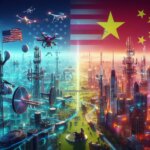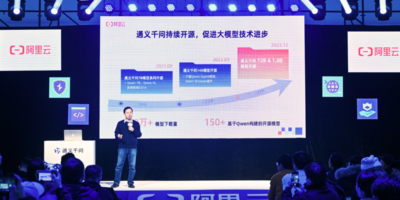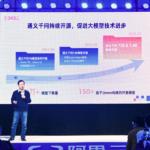
China vs US AI showdown – the US may be ahead, but China is in pursuit.(Generated with AI).
China vs the US in AI race: America leads, China playing catch up
- The US leads in the “US vs China AI” race, while China makes strides but faces tech access and regulatory challenges.
- US sanctions and market challenges impede China’s AI growth amid global competition.
- When it comes to the US vs China AI race, where do the lines of fair competition end?
In the past decade, China has emerged as a frontrunner in developing and applying digital technologies, particularly AI. The country’s leadership in AI is evident across various sectors, including e-commerce, ride-hailing, and autonomous driving. Chinese firms have become global competitors and critical drivers of the nation’s progress in these areas.
Concurrently, Chinese authorities have implemented regulations focusing on data and consumer protection. These measures are designed to ensure technology’s ethical use and curb potential market monopolies. This regulatory approach contrasts with the United States, another of the world’s AI powerhouses. Both nations, leading in AI technology and influence, set global standards, and their policies are pivotal in the unfolding US vs China AI race.
China’s advancement in AI, particularly since the 2010s, has been remarkable, matching or even surpassing that of the US in some fields like facial recognition. This progress is evident both in their rhetoric and their achievements on the international stage.
US vs China: challenges and responses in China’s AI sector
Despite these advancements, China faces significant challenges in the AI sector. The landscape shifted in November 2022 with OpenAI, a company backed by Microsoft, launching ChatGPT. This chatbot, built on the GPT-3.5 large language model, marked a significant milestone. Despite China’s efforts to cultivate local counterparts to ChatGPT, such as Baidu’s Ernie Bot and Alibaba Group Holding’s Tongyi Qianwen, American firms like OpenAI and Google continue to lead. OpenAI has since introduced GPT-4 Turbo, and Google has entered the fray with Bard.
While China has made notable progress, exemplified by Baidu’s AI chatbot launch in March and its subscription-based Ernie Bot 4.0, several obstacles persist. The South China Morning Post highlights the fact that the country’s AI sector, despite hosting over 100 large language models, faces challenges such as limited access to advanced chips, stringent regulations, censorship, high development costs, and a segmented technology market.
According to Su Lian Jye, chief analyst at Omdia, China confronts various hurdles in developing large language models. The technology gap with Western countries has widened, mainly due to GPT and Google’s Gemini. Constraints include chip bans affecting computing power and the relative quality of data from Mandarin internet sources compared to English.
Alphabet Inc., the parent company of Google, recently saw a 5.3% rise in its shares, a positive response from Wall Street to the launch of Gemini. This new AI model is seen as a potential game-changer in the competition with Microsoft-backed OpenAI.
Alphabet, a longstanding AI research leader, had lost some of its limelight to OpenAI’s ChatGPT. Now, with Gemini, Alphabet is poised to reclaim its position in AI innovation. Gemini is reportedly faster than OpenAI’s latest model and can process various media types, including video, audio, and text. It is available in three versions, each requiring different levels of processing power.
China’s accelerated pursuit of AI technology is often traced back to 2017, when AlphaGo, created by Alphabet’s DeepMind Technologies, defeated the world’s top Go player, Ke Jie, in a sweeping 3-0 victory. The ancient game of Go, rooted in the Zhou dynasty, has become emblematic of China’s urgent drive for AI advancement.
The impact of US sanctions on China’s AI ambitions
The country faces a significant obstacle in this journey, mainly due to limited access to advanced graphics processing units (GPUs) from companies like Nvidia, a restriction imposed by US trade sanctions. These GPUs, especially the Nvidia H100 (priced at around US$30,000 apiece), are vital for developing advanced large language models (LLMs). Major tech companies, including Microsoft, Meta Platforms, Google, Amazon, and Oracle, have all made substantial investments in these technologies.
Meanwhile, Chinese tech giants face purchasing limits imposed by the US government, which updated its export control regulations just a month before the release of OpenAI’s GPT. This move aimed to block China’s access to cutting-edge chips like Nvidia’s H100 and A100, citing “national security concerns.”
Su Lian Jye has highlighted the fact that China is encountering several challenges in developing LLMs, particularly as the technology gap with the West widens, accelerated by the introduction of GPT and Google’s Gemini.
Nvidia, a California-based company, has become a pivotal player in the US vs China AI race. It has been trying to overcome the challenges posed by US restrictions. The company has been developing slower variants of its chips, the A800 and H800, specifically for the Chinese market.
This strategy has supported Chinese companies like Tencent Holdings and ByteDance. These firms rely heavily on Nvidia’s technology, and Mainland China and Hong Kong are substantial revenue sources for Nvidia. However, the US government further escalated its restrictions by banning the sale of the A800 and H800 chips to China, while also issuing warnings against future attempts to circumvent these limitations. Clearly, Washington feels it needs supremacy in these chips.
US Commerce Secretary Gina Raimondo clarified that chip redesigns aiding China’s AI development would be swiftly regulated. This stance presents a significant obstacle for Chinese firms: Professor Wang Shuyi from Tianjin Normal University says the crucial issue of limited computing power is hindering AI development in China.

China will continue to make advancements in AI says an X user. (Source – X)
Amid these challenges, Alibaba has postponed the spin-off of its cloud unit, a decision influenced by uncertainties related to the US chip restrictions, despite developing its own LLM, Tongyi Qianwen. Tencent also raised concerns about the impact of these restrictions on its cloud services.
Chen Yu, partner at venture capital firm Yunqi Partners, notes the profound impact on big tech companies, who have placed substantial orders for chips that are now undeliverable, affecting their future cloud services. Nevertheless, Chinese startups may find solace in global public cloud services, which remain unrestricted.
The sanctions have had a significant impact, particularly as US companies like OpenAI and Nvidia lead in generative AI. Chinese AI firms, like SenseTime, struggle under these restrictions. Efforts to overcome chip limitations, such as collaborations between companies like iFlyTek and Huawei Technologies, are still hampered by the lack of a mature AI training ecosystem.
Foreign LLMs like OpenAI’s GPT series and Google’s Gemini remain inaccessible in China, largely due to strict regulatory controls by the Cyberspace Administration of China. The Cyberspace Administration of China requires thorough reviews and oversight of LLM development, leading to a distinct divide between domestic and global AI markets.
China’s internal AI market and global positioning
Concerns of duplicated efforts mark the AI landscape in China. Over 130 LLMs have been developed by local companies and research institutes. Baidu’s co-founder and chief executive, Robin Li Yanhong, criticizes this as wasteful, urging a focus on applications. Luo Yuchen, CEO of Shenzhen Yantu Intelligence and Innovation, and Wang Xiaochuan, CEO of AI startup Baichuan, echo this sentiment, emphasizing the need to use existing models and focus on scalable AI products.
Baidu and Alibaba have diverged in their AI strategies, with Alibaba Cloud open-sourcing its Qwen-72B AI model, while Baidu keeps its Ernie LLM proprietary. The cost of developing and training LLMs is substantial. For example, Meta’s Llama model required significant resources for its development, utilizing 2,048 Nvidia A100 GPUs for training and taking around 21 days, according to a CNBC report.
Despite these hurdles in accessing advanced computing power, China benefits from vast data resources, market applications, and entrepreneurial talent. Lee Kai-fu, a venture capitalist and former president of Google China, who has grown his AI startup 01.AI, exemplifies this, reaching a billion-dollar valuation despite controversies.
Ultimately, AI is a critical component for cloud business growth, with companies like Tencent and Huawei aiming to monetize AI technology through their cloud platforms. This dynamic underscores the diverse approaches and challenges in China’s evolving AI landscape.
READ MORE
- Safer Automation: How Sophic and Firmus Succeeded in Malaysia with MDEC’s Support
- Privilege granted, not gained: Intelligent authorization for enhanced infrastructure productivity
- Low-Code produces the Proof-of-Possibilities
- New Wearables Enable Staff to Work Faster and Safer
- Experts weigh in on Oracle’s departure from adland




